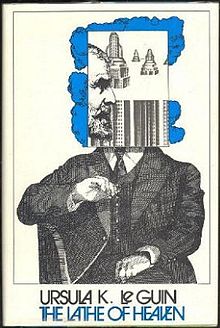How in the world did Ursula K. LeGuin think that an Earth with seven billion people in it would be on the brink of starvation?
This is just one of the issues I had with one of LeGuin’s more well-known works, The Lathe of Heaven. It’s still an excellent read despite all these issues. George Orr is an ordinary man with a very weird problem. Sometimes his dreams come true. Not in the sense of prophetic dreams, but his subconscious somehow retcons the entire universe so the dream has always been true, since the dawn of time. Naturally Orr winds up referred to a psychiatrist. The psychiatrist, Dr. William Haber, starts to manipulate Orr’s dreams for his own purposes…
Over the course of the book, Orr runs through a lot of universes, exploring a bunch of mostly dystopian science fiction ideas along the way. (Notice his name is a pun on George Orwell?)
At the beginning of the book, the year is 2002 and global warming has melted all the ice in the world, including Antarctica. This is even true in realities where the human population – and thus CO2 emissions – nosedive sometime in the 1970’s. In realities where the world’s population is still seven billion, the people of Portland are crammed in so tight they can barely move, and the state of Oregon has to build several more cities in the desert, each containing millions of people.
I can’t fault LeGuin for getting the details of global warming wrong, since this book was published in 1971. But she’s too smart to miscalculate how many people a world can physically hold. All one needs to figure that out is the square footage of a typical one-bedroom apartment, the square footage of the world’s urban areas, and some math.
Another objection I have is to Dr. Haber. The book’s meant to present a moral dilemma: How far would you go to make the world a better place? That’s a fine dilemma and one I’d like to see explored. Dr. Haber’s meant to be a sympathetic character who makes questionable choices. But in practice, Dr. Haber behaves so despicably that this book does not work for me as a dilemma.
I am a scientist. I have a thing about scientific ethics. And Dr. Haber blazes past the bounds of acceptable behavior within the first dozen pages. He is literally performing medical experimentation on an unwilling patient with no protocol, no control group, and no institutional oversight. And he’s stupid. When one of his experiments on Orr kills six billion people, does it occur to Dr. Haber that this project is dangerous and he should stop? No.
There’s merit to watching a monster version of my own profession in action. And Dr. Haber makes a great villain. But a moral dilemma he does not make. I want to see him squashed like a bug. (I found the end of the book quite satisfying, but I’ll leave the reader to discover the details on their own.)
The Lathe of Heaven is meant to critique utilitarian ethics. But like I said earlier, Dr. Haber inadvertently kills six billion people for the sake of the remaining one billion. Sacrificing the many for the sake of the few is far from a utilitarian ideal. One of LeGuin’s short stories, “The Ones Who Walk Away From Omelas,” does a much better job of critiquing utilitarianism.
And LeGuin puts Taoist philosophy into characters’ mouths when they don’t have any in-universe reason to know these things.
But that’s enough ranting for now. Though I have all these objections to the book, at no point does LeGuin slip into shoddy writing. The book’s beautiful. And I disagree with it. And I like it when books bite back.
It’s wonderfully ambiguous what’s actually going on with Orr’s mind. There is a Blade-Runner-like blink-and-you’ll-miss-it moment at the beginning of the book that changes everything.
All the universes Orr surfs through remind us how weird our universe is compared to what science fiction writers expected. We live in the world where the Soviet Union sort of evaporated in 1991. Where obesity now poses a greater worldwide health burden than undernutrition. Where Eastern Europe and Japan aren’t having enough babies. Where it’s 2015 and we still haven’t conquered space, but we’re still managing to do some really awesome things with it.


